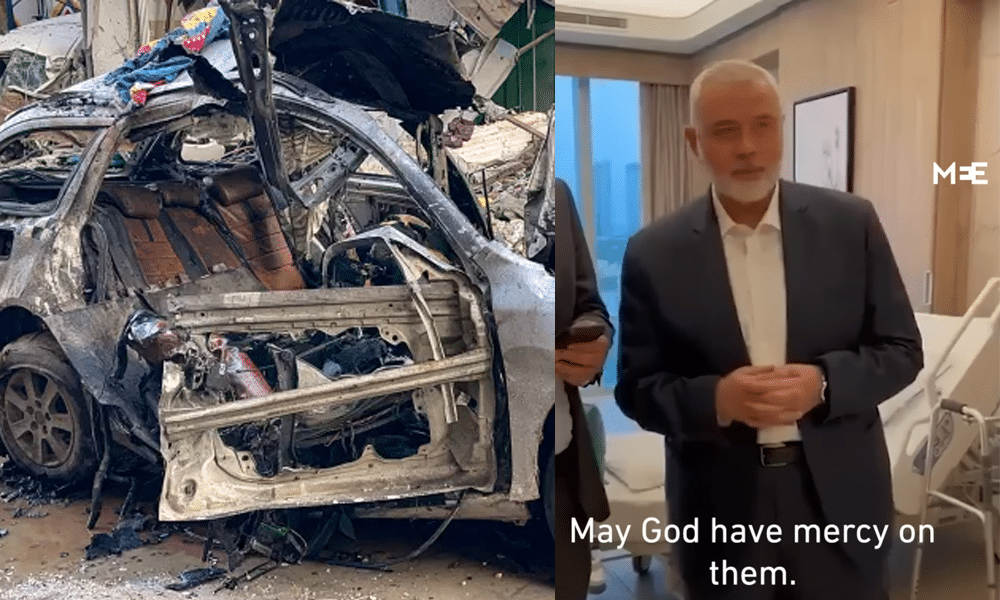In a heartrending incident amidst ongoing conflict, an Israeli airstrike on Wednesday in the Gaza Strip resulted in the deaths of three sons and four grandchildren of Hamas leader Ismail Haniyeh.
This tragic event, confirmed by both the Palestinian Islamist group and Haniyeh’s family, has sent shockwaves through the region. The Israeli military, acknowledging the operation, labelled the three sons as operatives within Hamas’s armed faction.
The strike targeted the vehicle carrying Hazem, Amir, and Mohammad in Gaza’s Al-Shati camp, marking a sorrowful chapter for the family. In response to inquiries about the grandchildren’s deaths, the Israeli military stated it had “no information on that right now.”
Ismail Haniyeh, who is currently based in Qatar and has been a key figure in Hamas’s international diplomacy, responded to the tragedy with a profound statement to Al Jazeera TV, “The blood of my sons is not dearer than the blood of our people.”
A recorded video captured the moment Ismail Haniyeh learned of his sons’ and grandchildren’s deaths, showing him responding with “may God have mercy on them” before resolutely continuing with his activities.
The attack occurred as the family gathered in Shati, their home refugee camp in Gaza City, during the first day of the Muslim Eid al-Fitr holiday.
Amidst these circumstances, Haniyeh has articulated a firm stance on the Israeli ceasefire proposal. “Our demands are clear and specific and we will not make concessions on them. The enemy will be delusional if it thinks that targeting my sons at the climax of the negotiations and before the movement sends its response will push Hamas to change its position,” Haniyeh stated, signalling unwavering resolve even in the face of personal tragedy.
As Gaza endures the seventh month of a devastating conflict, Hamas’s demands centre on ending Israeli military operations and allowing displaced Palestinians to return home.
In a poignant expression of grief and pride, Abdel-Salam Haniyeh, the eldest son of Ismail Haniyeh, took to Facebook to acknowledge the martyrdom of his brothers and their children, writing, “Thanks to God who honoured us by the martyrdom of my brothers, Hazem, Amir and Mohammad and their children.”
Since taking the helm of Hamas in 2017, Ismail Haniyeh has strategically manoeuvred between Turkey and Qatar’s Doha, evading the travel limitations imposed by Israel on the besieged Gaza.
This mobility has facilitated his pivotal role in the latest ceasefire discussions and in maintaining dialogue with Iran, Hamas’s principal ally. Israel categorically considers all of Hamas’s leadership as terrorists, explicitly accusing Haniyeh and his counterparts of orchestrating operations of the Hamas terrorist network.
The extent of Haniyeh’s prior knowledge regarding the Oct. 7 assault by Gaza militants on Israel remains ambiguous. The operation, meticulously planned by Hamas’s military council in Gaza, was kept so confidential that even some Hamas leaders outside of Gaza were taken aback by its scope and timing.
In the aftermath of the Israeli strike that resulted in the deaths of three of Haniyeh’s children and four grandchildren, Basem Naim, a senior Hamas official, criticized Israeli Prime Minister Netanyahu.
He accused Netanyahu of exerting every effort to thwart any possibility of a ceasefire agreement. According to Naim, Netanyahu faces immense pressure from the United States, the global community, and the Israeli public, prompting him to employ “all other dirty tools,” including targeting the families of Hamas leaders, in his strategies.

